PPD Plan: Personal and Professional Development Plan Analysis Report
VerifiedAdded on 2023/01/04
|12
|3728
|32
Report
AI Summary
This report presents a Personal and Professional Development (PPD) plan, outlining the process of self-improvement and career advancement. The introduction emphasizes the importance of continuous learning and skill enhancement to meet evolving employment demands. The report details the PPD planning process, including setting objectives, assessing current realities, identifying skill needs, and choosing developmental activities. A SWOT analysis is conducted to identify personal strengths and weaknesses, as well as opportunities and threats. The VARK model is also applied to determine learning styles. The report concludes with a PDP plan incorporating the SWOT analysis, VARK model, and Gibbs model and provides a reflection on personal and professional development, aiming to guide the participant in controlling their development and improvement throughout their career.
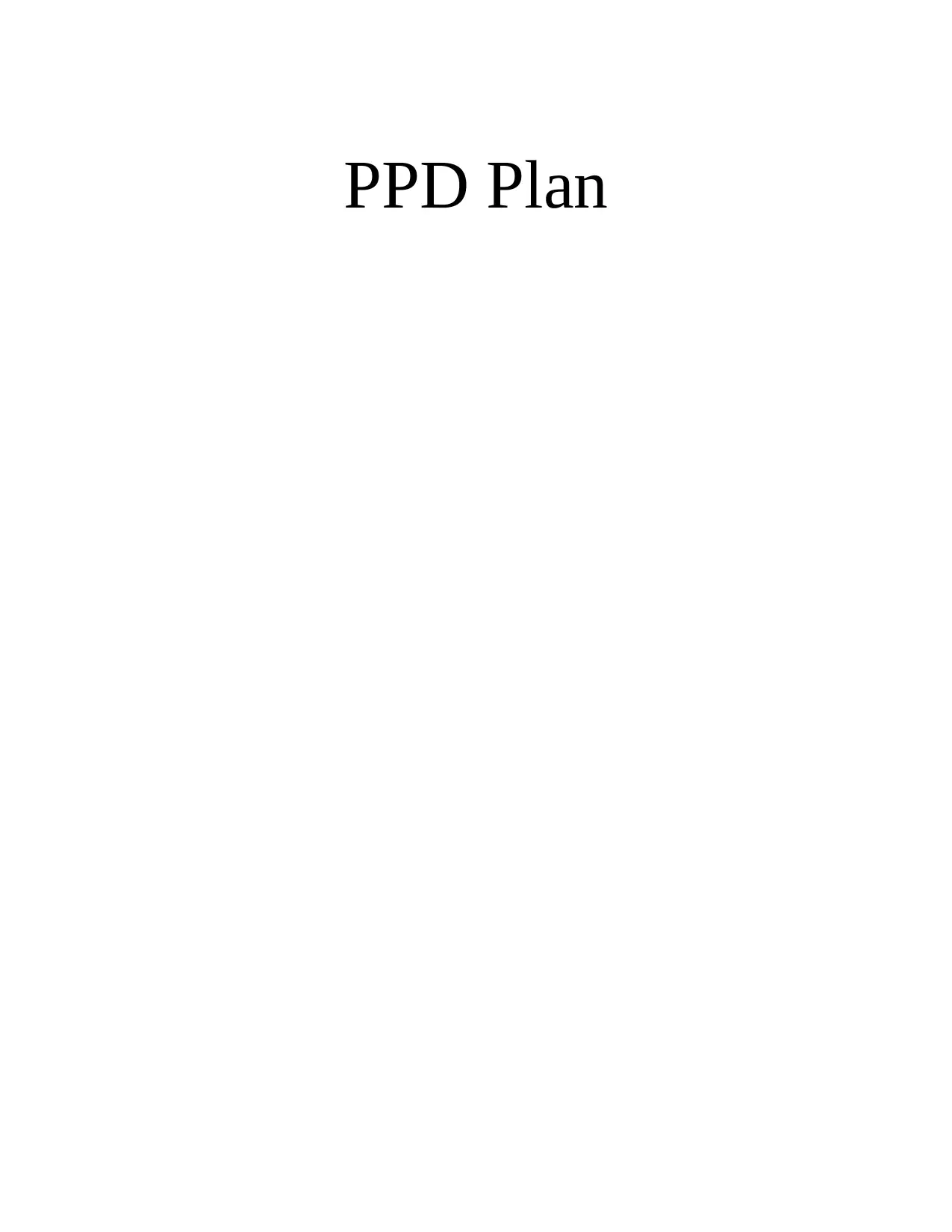
PPD Plan
Paraphrase This Document
Need a fresh take? Get an instant paraphrase of this document with our AI Paraphraser
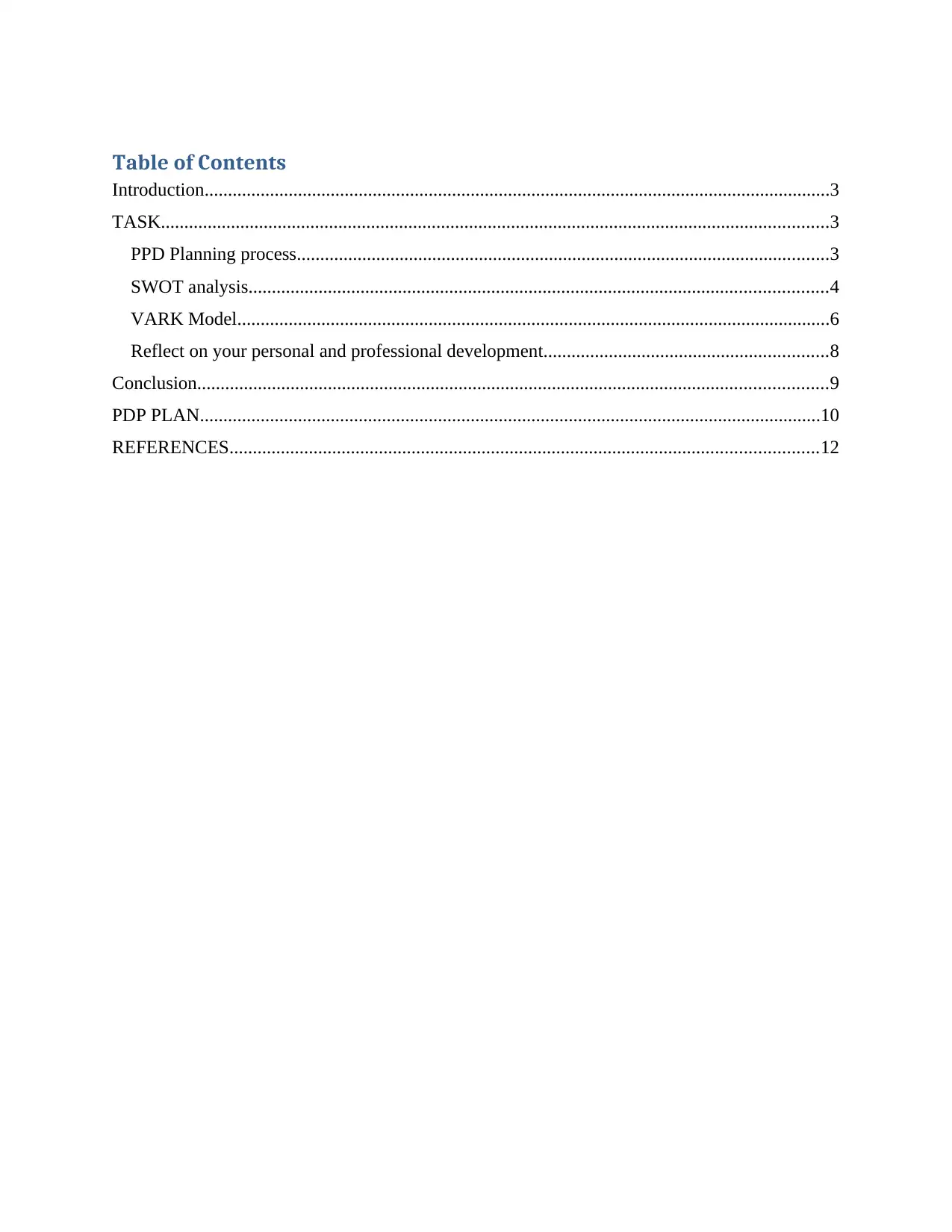
Table of Contents
Introduction......................................................................................................................................3
TASK...............................................................................................................................................3
PPD Planning process..................................................................................................................3
SWOT analysis............................................................................................................................4
VARK Model...............................................................................................................................6
Reflect on your personal and professional development.............................................................8
Conclusion.......................................................................................................................................9
PDP PLAN.....................................................................................................................................10
REFERENCES..............................................................................................................................12
Introduction......................................................................................................................................3
TASK...............................................................................................................................................3
PPD Planning process..................................................................................................................3
SWOT analysis............................................................................................................................4
VARK Model...............................................................................................................................6
Reflect on your personal and professional development.............................................................8
Conclusion.......................................................................................................................................9
PDP PLAN.....................................................................................................................................10
REFERENCES..............................................................................................................................12
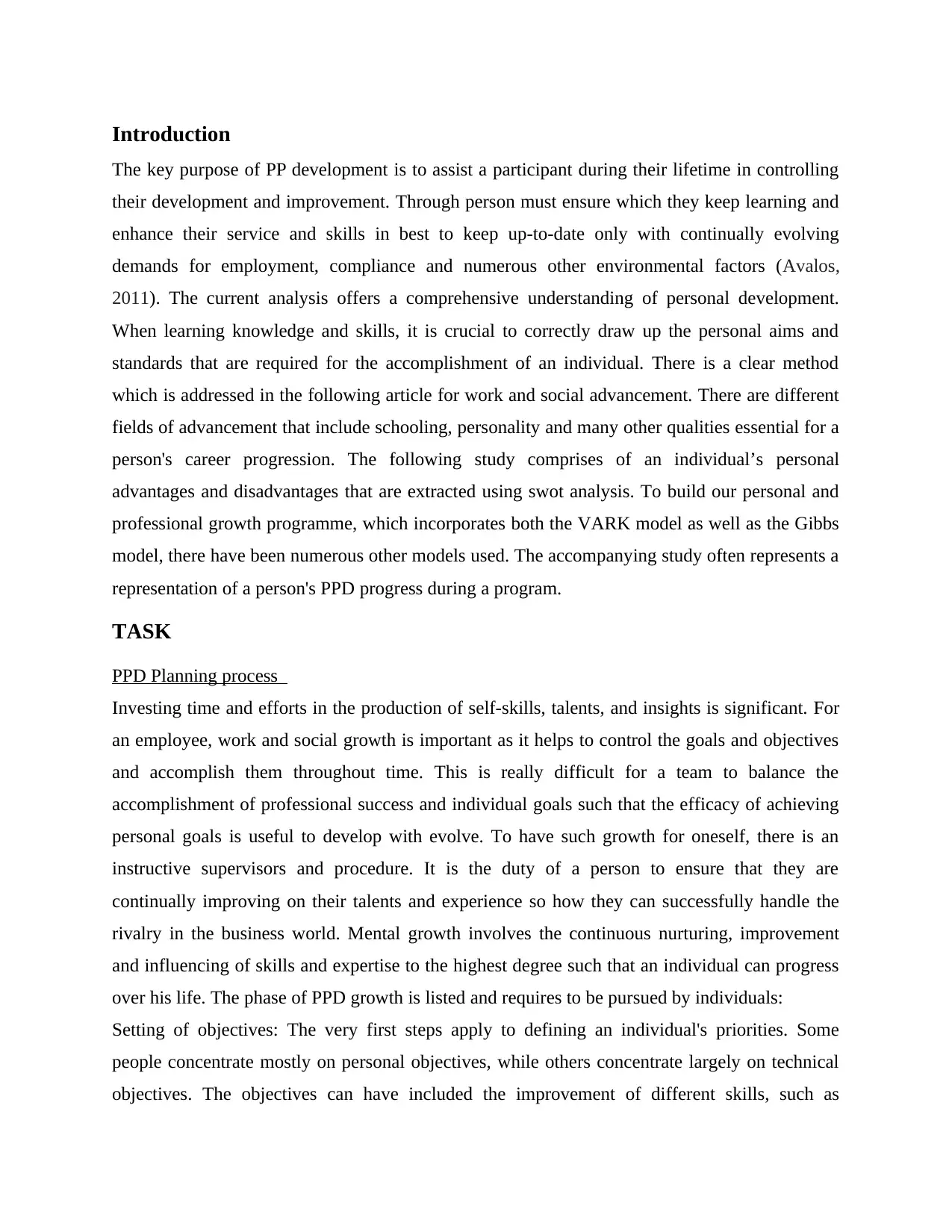
Introduction
The key purpose of PP development is to assist a participant during their lifetime in controlling
their development and improvement. Through person must ensure which they keep learning and
enhance their service and skills in best to keep up-to-date only with continually evolving
demands for employment, compliance and numerous other environmental factors (Avalos,
2011). The current analysis offers a comprehensive understanding of personal development.
When learning knowledge and skills, it is crucial to correctly draw up the personal aims and
standards that are required for the accomplishment of an individual. There is a clear method
which is addressed in the following article for work and social advancement. There are different
fields of advancement that include schooling, personality and many other qualities essential for a
person's career progression. The following study comprises of an individual’s personal
advantages and disadvantages that are extracted using swot analysis. To build our personal and
professional growth programme, which incorporates both the VARK model as well as the Gibbs
model, there have been numerous other models used. The accompanying study often represents a
representation of a person's PPD progress during a program.
TASK
PPD Planning process
Investing time and efforts in the production of self-skills, talents, and insights is significant. For
an employee, work and social growth is important as it helps to control the goals and objectives
and accomplish them throughout time. This is really difficult for a team to balance the
accomplishment of professional success and individual goals such that the efficacy of achieving
personal goals is useful to develop with evolve. To have such growth for oneself, there is an
instructive supervisors and procedure. It is the duty of a person to ensure that they are
continually improving on their talents and experience so how they can successfully handle the
rivalry in the business world. Mental growth involves the continuous nurturing, improvement
and influencing of skills and expertise to the highest degree such that an individual can progress
over his life. The phase of PPD growth is listed and requires to be pursued by individuals:
Setting of objectives: The very first steps apply to defining an individual's priorities. Some
people concentrate mostly on personal objectives, while others concentrate largely on technical
objectives. The objectives can have included the improvement of different skills, such as
The key purpose of PP development is to assist a participant during their lifetime in controlling
their development and improvement. Through person must ensure which they keep learning and
enhance their service and skills in best to keep up-to-date only with continually evolving
demands for employment, compliance and numerous other environmental factors (Avalos,
2011). The current analysis offers a comprehensive understanding of personal development.
When learning knowledge and skills, it is crucial to correctly draw up the personal aims and
standards that are required for the accomplishment of an individual. There is a clear method
which is addressed in the following article for work and social advancement. There are different
fields of advancement that include schooling, personality and many other qualities essential for a
person's career progression. The following study comprises of an individual’s personal
advantages and disadvantages that are extracted using swot analysis. To build our personal and
professional growth programme, which incorporates both the VARK model as well as the Gibbs
model, there have been numerous other models used. The accompanying study often represents a
representation of a person's PPD progress during a program.
TASK
PPD Planning process
Investing time and efforts in the production of self-skills, talents, and insights is significant. For
an employee, work and social growth is important as it helps to control the goals and objectives
and accomplish them throughout time. This is really difficult for a team to balance the
accomplishment of professional success and individual goals such that the efficacy of achieving
personal goals is useful to develop with evolve. To have such growth for oneself, there is an
instructive supervisors and procedure. It is the duty of a person to ensure that they are
continually improving on their talents and experience so how they can successfully handle the
rivalry in the business world. Mental growth involves the continuous nurturing, improvement
and influencing of skills and expertise to the highest degree such that an individual can progress
over his life. The phase of PPD growth is listed and requires to be pursued by individuals:
Setting of objectives: The very first steps apply to defining an individual's priorities. Some
people concentrate mostly on personal objectives, while others concentrate largely on technical
objectives. The objectives can have included the improvement of different skills, such as
⊘ This is a preview!⊘
Do you want full access?
Subscribe today to unlock all pages.

Trusted by 1+ million students worldwide
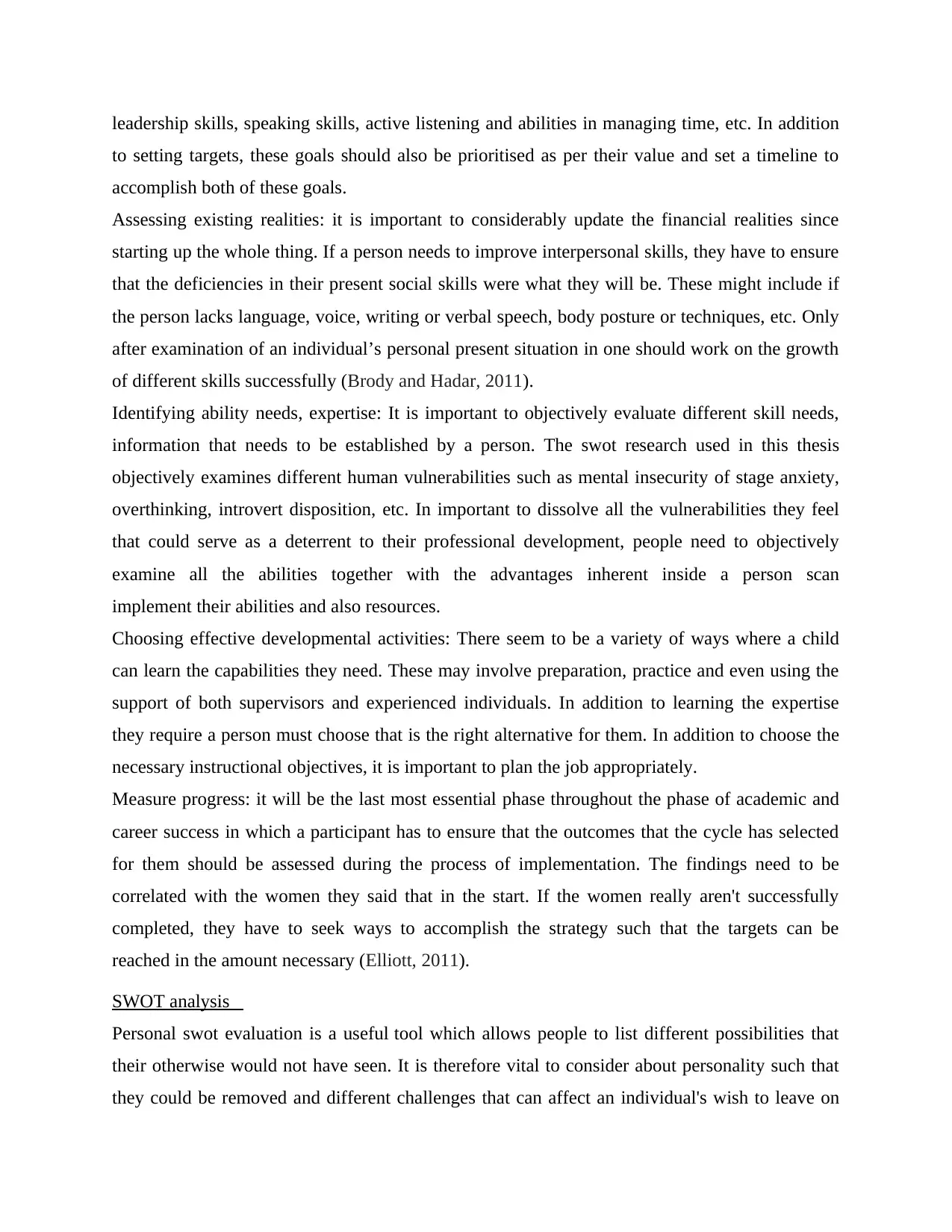
leadership skills, speaking skills, active listening and abilities in managing time, etc. In addition
to setting targets, these goals should also be prioritised as per their value and set a timeline to
accomplish both of these goals.
Assessing existing realities: it is important to considerably update the financial realities since
starting up the whole thing. If a person needs to improve interpersonal skills, they have to ensure
that the deficiencies in their present social skills were what they will be. These might include if
the person lacks language, voice, writing or verbal speech, body posture or techniques, etc. Only
after examination of an individual’s personal present situation in one should work on the growth
of different skills successfully (Brody and Hadar, 2011).
Identifying ability needs, expertise: It is important to objectively evaluate different skill needs,
information that needs to be established by a person. The swot research used in this thesis
objectively examines different human vulnerabilities such as mental insecurity of stage anxiety,
overthinking, introvert disposition, etc. In important to dissolve all the vulnerabilities they feel
that could serve as a deterrent to their professional development, people need to objectively
examine all the abilities together with the advantages inherent inside a person scan
implement their abilities and also resources.
Choosing effective developmental activities: There seem to be a variety of ways where a child
can learn the capabilities they need. These may involve preparation, practice and even using the
support of both supervisors and experienced individuals. In addition to learning the expertise
they require a person must choose that is the right alternative for them. In addition to choose the
necessary instructional objectives, it is important to plan the job appropriately.
Measure progress: it will be the last most essential phase throughout the phase of academic and
career success in which a participant has to ensure that the outcomes that the cycle has selected
for them should be assessed during the process of implementation. The findings need to be
correlated with the women they said that in the start. If the women really aren't successfully
completed, they have to seek ways to accomplish the strategy such that the targets can be
reached in the amount necessary (Elliott, 2011).
SWOT analysis
Personal swot evaluation is a useful tool which allows people to list different possibilities that
their otherwise would not have seen. It is therefore vital to consider about personality such that
they could be removed and different challenges that can affect an individual's wish to leave on
to setting targets, these goals should also be prioritised as per their value and set a timeline to
accomplish both of these goals.
Assessing existing realities: it is important to considerably update the financial realities since
starting up the whole thing. If a person needs to improve interpersonal skills, they have to ensure
that the deficiencies in their present social skills were what they will be. These might include if
the person lacks language, voice, writing or verbal speech, body posture or techniques, etc. Only
after examination of an individual’s personal present situation in one should work on the growth
of different skills successfully (Brody and Hadar, 2011).
Identifying ability needs, expertise: It is important to objectively evaluate different skill needs,
information that needs to be established by a person. The swot research used in this thesis
objectively examines different human vulnerabilities such as mental insecurity of stage anxiety,
overthinking, introvert disposition, etc. In important to dissolve all the vulnerabilities they feel
that could serve as a deterrent to their professional development, people need to objectively
examine all the abilities together with the advantages inherent inside a person scan
implement their abilities and also resources.
Choosing effective developmental activities: There seem to be a variety of ways where a child
can learn the capabilities they need. These may involve preparation, practice and even using the
support of both supervisors and experienced individuals. In addition to learning the expertise
they require a person must choose that is the right alternative for them. In addition to choose the
necessary instructional objectives, it is important to plan the job appropriately.
Measure progress: it will be the last most essential phase throughout the phase of academic and
career success in which a participant has to ensure that the outcomes that the cycle has selected
for them should be assessed during the process of implementation. The findings need to be
correlated with the women they said that in the start. If the women really aren't successfully
completed, they have to seek ways to accomplish the strategy such that the targets can be
reached in the amount necessary (Elliott, 2011).
SWOT analysis
Personal swot evaluation is a useful tool which allows people to list different possibilities that
their otherwise would not have seen. It is therefore vital to consider about personality such that
they could be removed and different challenges that can affect an individual's wish to leave on
Paraphrase This Document
Need a fresh take? Get an instant paraphrase of this document with our AI Paraphraser
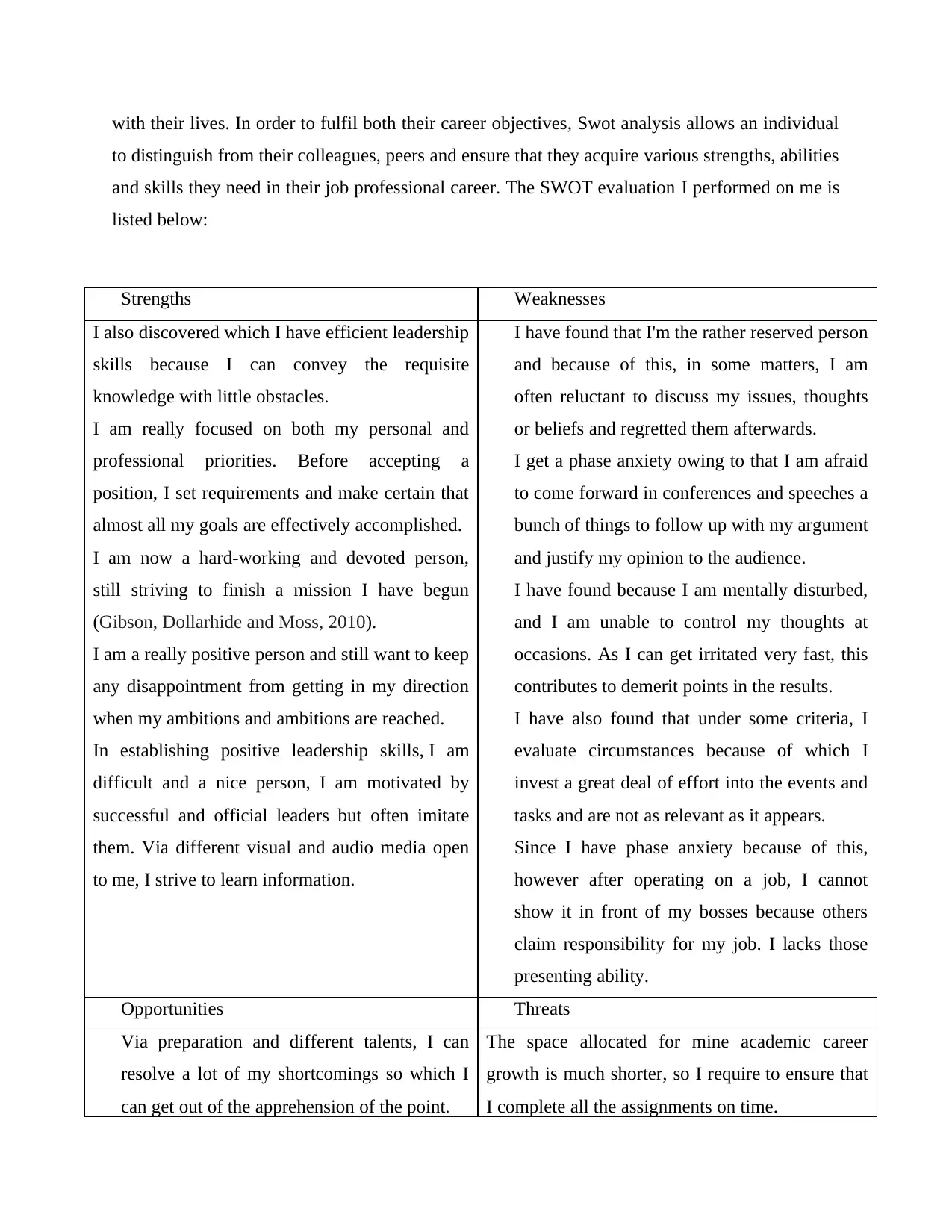
with their lives. In order to fulfil both their career objectives, Swot analysis allows an individual
to distinguish from their colleagues, peers and ensure that they acquire various strengths, abilities
and skills they need in their job professional career. The SWOT evaluation I performed on me is
listed below:
Strengths Weaknesses
I also discovered which I have efficient leadership
skills because I can convey the requisite
knowledge with little obstacles.
I am really focused on both my personal and
professional priorities. Before accepting a
position, I set requirements and make certain that
almost all my goals are effectively accomplished.
I am now a hard-working and devoted person,
still striving to finish a mission I have begun
(Gibson, Dollarhide and Moss, 2010).
I am a really positive person and still want to keep
any disappointment from getting in my direction
when my ambitions and ambitions are reached.
In establishing positive leadership skills, I am
difficult and a nice person, I am motivated by
successful and official leaders but often imitate
them. Via different visual and audio media open
to me, I strive to learn information.
I have found that I'm the rather reserved person
and because of this, in some matters, I am
often reluctant to discuss my issues, thoughts
or beliefs and regretted them afterwards.
I get a phase anxiety owing to that I am afraid
to come forward in conferences and speeches a
bunch of things to follow up with my argument
and justify my opinion to the audience.
I have found because I am mentally disturbed,
and I am unable to control my thoughts at
occasions. As I can get irritated very fast, this
contributes to demerit points in the results.
I have also found that under some criteria, I
evaluate circumstances because of which I
invest a great deal of effort into the events and
tasks and are not as relevant as it appears.
Since I have phase anxiety because of this,
however after operating on a job, I cannot
show it in front of my bosses because others
claim responsibility for my job. I lacks those
presenting ability.
Opportunities Threats
Via preparation and different talents, I can
resolve a lot of my shortcomings so which I
can get out of the apprehension of the point.
The space allocated for mine academic career
growth is much shorter, so I require to ensure that
I complete all the assignments on time.
to distinguish from their colleagues, peers and ensure that they acquire various strengths, abilities
and skills they need in their job professional career. The SWOT evaluation I performed on me is
listed below:
Strengths Weaknesses
I also discovered which I have efficient leadership
skills because I can convey the requisite
knowledge with little obstacles.
I am really focused on both my personal and
professional priorities. Before accepting a
position, I set requirements and make certain that
almost all my goals are effectively accomplished.
I am now a hard-working and devoted person,
still striving to finish a mission I have begun
(Gibson, Dollarhide and Moss, 2010).
I am a really positive person and still want to keep
any disappointment from getting in my direction
when my ambitions and ambitions are reached.
In establishing positive leadership skills, I am
difficult and a nice person, I am motivated by
successful and official leaders but often imitate
them. Via different visual and audio media open
to me, I strive to learn information.
I have found that I'm the rather reserved person
and because of this, in some matters, I am
often reluctant to discuss my issues, thoughts
or beliefs and regretted them afterwards.
I get a phase anxiety owing to that I am afraid
to come forward in conferences and speeches a
bunch of things to follow up with my argument
and justify my opinion to the audience.
I have found because I am mentally disturbed,
and I am unable to control my thoughts at
occasions. As I can get irritated very fast, this
contributes to demerit points in the results.
I have also found that under some criteria, I
evaluate circumstances because of which I
invest a great deal of effort into the events and
tasks and are not as relevant as it appears.
Since I have phase anxiety because of this,
however after operating on a job, I cannot
show it in front of my bosses because others
claim responsibility for my job. I lacks those
presenting ability.
Opportunities Threats
Via preparation and different talents, I can
resolve a lot of my shortcomings so which I
can get out of the apprehension of the point.
The space allocated for mine academic career
growth is much shorter, so I require to ensure that
I complete all the assignments on time.
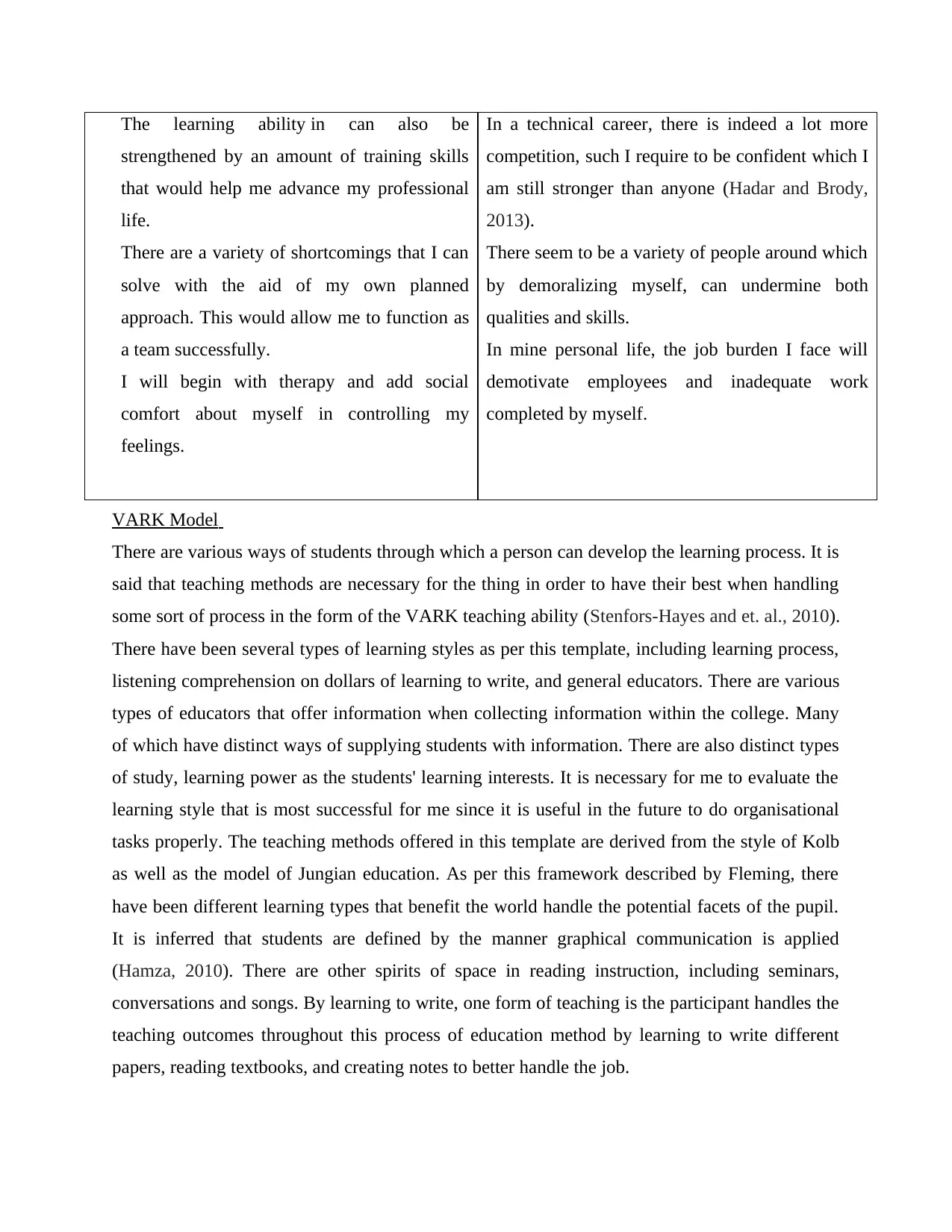
The learning ability in can also be
strengthened by an amount of training skills
that would help me advance my professional
life.
There are a variety of shortcomings that I can
solve with the aid of my own planned
approach. This would allow me to function as
a team successfully.
I will begin with therapy and add social
comfort about myself in controlling my
feelings.
In a technical career, there is indeed a lot more
competition, such I require to be confident which I
am still stronger than anyone (Hadar and Brody,
2013).
There seem to be a variety of people around which
by demoralizing myself, can undermine both
qualities and skills.
In mine personal life, the job burden I face will
demotivate employees and inadequate work
completed by myself.
VARK Model
There are various ways of students through which a person can develop the learning process. It is
said that teaching methods are necessary for the thing in order to have their best when handling
some sort of process in the form of the VARK teaching ability (Stenfors-Hayes and et. al., 2010).
There have been several types of learning styles as per this template, including learning process,
listening comprehension on dollars of learning to write, and general educators. There are various
types of educators that offer information when collecting information within the college. Many
of which have distinct ways of supplying students with information. There are also distinct types
of study, learning power as the students' learning interests. It is necessary for me to evaluate the
learning style that is most successful for me since it is useful in the future to do organisational
tasks properly. The teaching methods offered in this template are derived from the style of Kolb
as well as the model of Jungian education. As per this framework described by Fleming, there
have been different learning types that benefit the world handle the potential facets of the pupil.
It is inferred that students are defined by the manner graphical communication is applied
(Hamza, 2010). There are other spirits of space in reading instruction, including seminars,
conversations and songs. By learning to write, one form of teaching is the participant handles the
teaching outcomes throughout this process of education method by learning to write different
papers, reading textbooks, and creating notes to better handle the job.
strengthened by an amount of training skills
that would help me advance my professional
life.
There are a variety of shortcomings that I can
solve with the aid of my own planned
approach. This would allow me to function as
a team successfully.
I will begin with therapy and add social
comfort about myself in controlling my
feelings.
In a technical career, there is indeed a lot more
competition, such I require to be confident which I
am still stronger than anyone (Hadar and Brody,
2013).
There seem to be a variety of people around which
by demoralizing myself, can undermine both
qualities and skills.
In mine personal life, the job burden I face will
demotivate employees and inadequate work
completed by myself.
VARK Model
There are various ways of students through which a person can develop the learning process. It is
said that teaching methods are necessary for the thing in order to have their best when handling
some sort of process in the form of the VARK teaching ability (Stenfors-Hayes and et. al., 2010).
There have been several types of learning styles as per this template, including learning process,
listening comprehension on dollars of learning to write, and general educators. There are various
types of educators that offer information when collecting information within the college. Many
of which have distinct ways of supplying students with information. There are also distinct types
of study, learning power as the students' learning interests. It is necessary for me to evaluate the
learning style that is most successful for me since it is useful in the future to do organisational
tasks properly. The teaching methods offered in this template are derived from the style of Kolb
as well as the model of Jungian education. As per this framework described by Fleming, there
have been different learning types that benefit the world handle the potential facets of the pupil.
It is inferred that students are defined by the manner graphical communication is applied
(Hamza, 2010). There are other spirits of space in reading instruction, including seminars,
conversations and songs. By learning to write, one form of teaching is the participant handles the
teaching outcomes throughout this process of education method by learning to write different
papers, reading textbooks, and creating notes to better handle the job.
⊘ This is a preview!⊘
Do you want full access?
Subscribe today to unlock all pages.

Trusted by 1+ million students worldwide
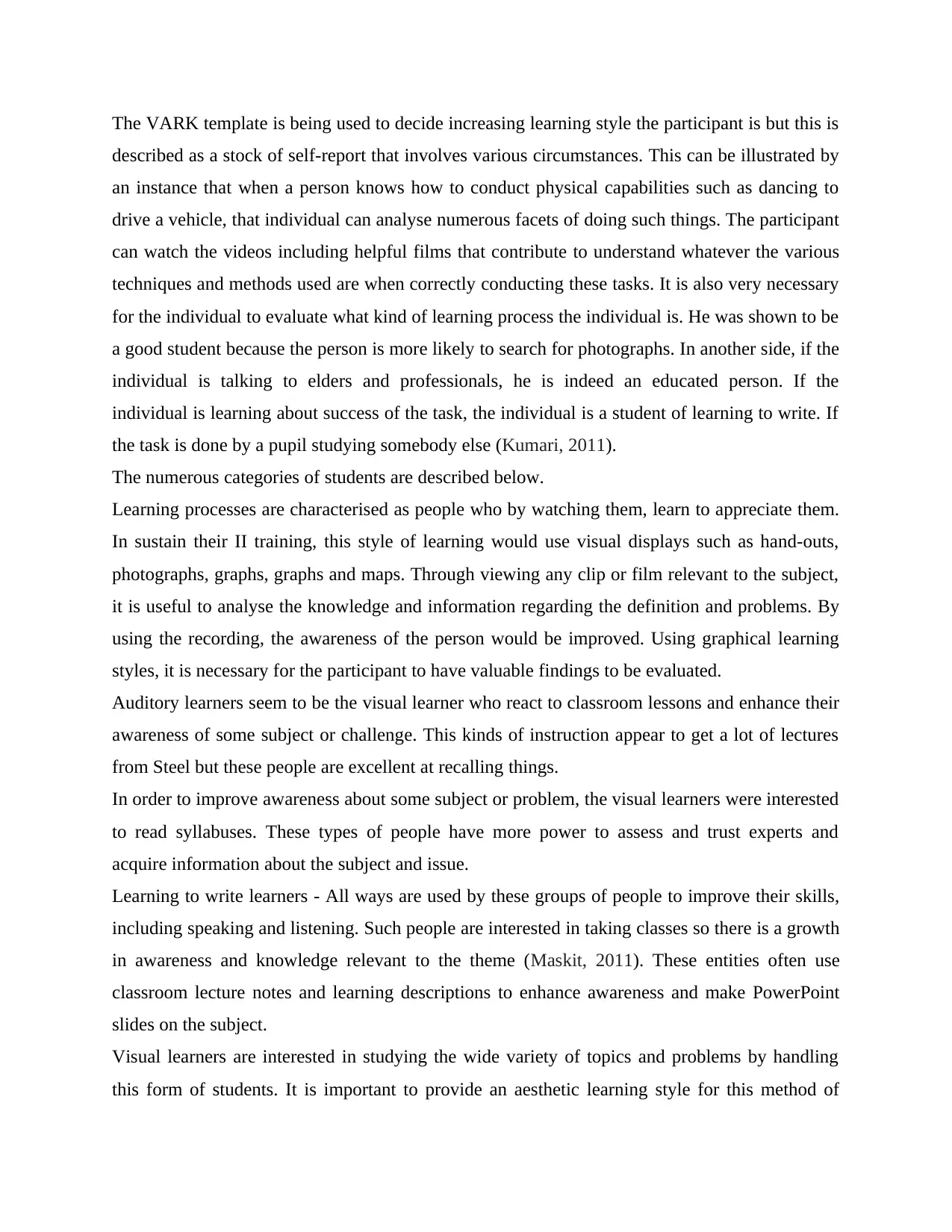
The VARK template is being used to decide increasing learning style the participant is but this is
described as a stock of self-report that involves various circumstances. This can be illustrated by
an instance that when a person knows how to conduct physical capabilities such as dancing to
drive a vehicle, that individual can analyse numerous facets of doing such things. The participant
can watch the videos including helpful films that contribute to understand whatever the various
techniques and methods used are when correctly conducting these tasks. It is also very necessary
for the individual to evaluate what kind of learning process the individual is. He was shown to be
a good student because the person is more likely to search for photographs. In another side, if the
individual is talking to elders and professionals, he is indeed an educated person. If the
individual is learning about success of the task, the individual is a student of learning to write. If
the task is done by a pupil studying somebody else (Kumari, 2011).
The numerous categories of students are described below.
Learning processes are characterised as people who by watching them, learn to appreciate them.
In sustain their II training, this style of learning would use visual displays such as hand-outs,
photographs, graphs, graphs and maps. Through viewing any clip or film relevant to the subject,
it is useful to analyse the knowledge and information regarding the definition and problems. By
using the recording, the awareness of the person would be improved. Using graphical learning
styles, it is necessary for the participant to have valuable findings to be evaluated.
Auditory learners seem to be the visual learner who react to classroom lessons and enhance their
awareness of some subject or challenge. This kinds of instruction appear to get a lot of lectures
from Steel but these people are excellent at recalling things.
In order to improve awareness about some subject or problem, the visual learners were interested
to read syllabuses. These types of people have more power to assess and trust experts and
acquire information about the subject and issue.
Learning to write learners - All ways are used by these groups of people to improve their skills,
including speaking and listening. Such people are interested in taking classes so there is a growth
in awareness and knowledge relevant to the theme (Maskit, 2011). These entities often use
classroom lecture notes and learning descriptions to enhance awareness and make PowerPoint
slides on the subject.
Visual learners are interested in studying the wide variety of topics and problems by handling
this form of students. It is important to provide an aesthetic learning style for this method of
described as a stock of self-report that involves various circumstances. This can be illustrated by
an instance that when a person knows how to conduct physical capabilities such as dancing to
drive a vehicle, that individual can analyse numerous facets of doing such things. The participant
can watch the videos including helpful films that contribute to understand whatever the various
techniques and methods used are when correctly conducting these tasks. It is also very necessary
for the individual to evaluate what kind of learning process the individual is. He was shown to be
a good student because the person is more likely to search for photographs. In another side, if the
individual is talking to elders and professionals, he is indeed an educated person. If the
individual is learning about success of the task, the individual is a student of learning to write. If
the task is done by a pupil studying somebody else (Kumari, 2011).
The numerous categories of students are described below.
Learning processes are characterised as people who by watching them, learn to appreciate them.
In sustain their II training, this style of learning would use visual displays such as hand-outs,
photographs, graphs, graphs and maps. Through viewing any clip or film relevant to the subject,
it is useful to analyse the knowledge and information regarding the definition and problems. By
using the recording, the awareness of the person would be improved. Using graphical learning
styles, it is necessary for the participant to have valuable findings to be evaluated.
Auditory learners seem to be the visual learner who react to classroom lessons and enhance their
awareness of some subject or challenge. This kinds of instruction appear to get a lot of lectures
from Steel but these people are excellent at recalling things.
In order to improve awareness about some subject or problem, the visual learners were interested
to read syllabuses. These types of people have more power to assess and trust experts and
acquire information about the subject and issue.
Learning to write learners - All ways are used by these groups of people to improve their skills,
including speaking and listening. Such people are interested in taking classes so there is a growth
in awareness and knowledge relevant to the theme (Maskit, 2011). These entities often use
classroom lecture notes and learning descriptions to enhance awareness and make PowerPoint
slides on the subject.
Visual learners are interested in studying the wide variety of topics and problems by handling
this form of students. It is important to provide an aesthetic learning style for this method of
Paraphrase This Document
Need a fresh take? Get an instant paraphrase of this document with our AI Paraphraser
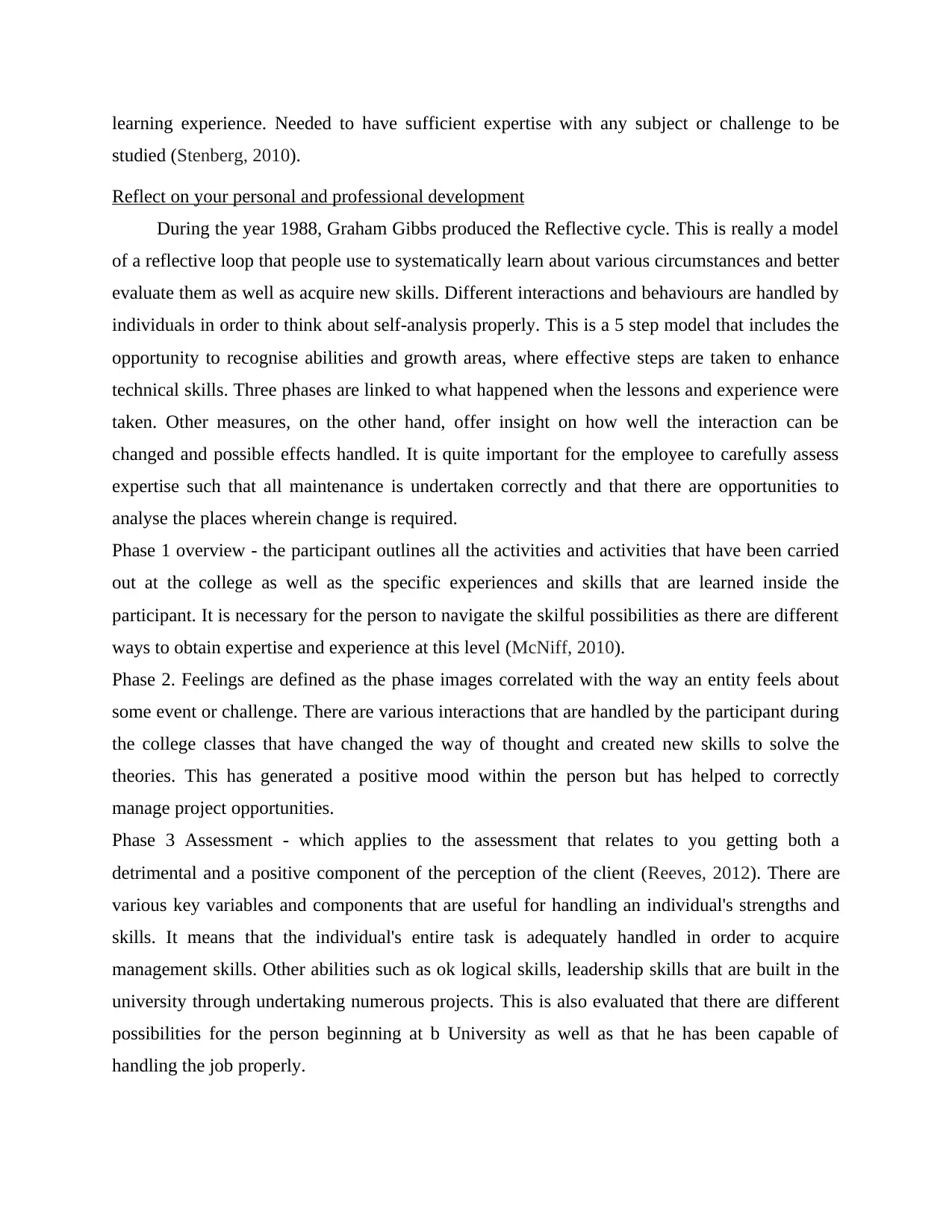
learning experience. Needed to have sufficient expertise with any subject or challenge to be
studied (Stenberg, 2010).
Reflect on your personal and professional development
During the year 1988, Graham Gibbs produced the Reflective cycle. This is really a model
of a reflective loop that people use to systematically learn about various circumstances and better
evaluate them as well as acquire new skills. Different interactions and behaviours are handled by
individuals in order to think about self-analysis properly. This is a 5 step model that includes the
opportunity to recognise abilities and growth areas, where effective steps are taken to enhance
technical skills. Three phases are linked to what happened when the lessons and experience were
taken. Other measures, on the other hand, offer insight on how well the interaction can be
changed and possible effects handled. It is quite important for the employee to carefully assess
expertise such that all maintenance is undertaken correctly and that there are opportunities to
analyse the places wherein change is required.
Phase 1 overview - the participant outlines all the activities and activities that have been carried
out at the college as well as the specific experiences and skills that are learned inside the
participant. It is necessary for the person to navigate the skilful possibilities as there are different
ways to obtain expertise and experience at this level (McNiff, 2010).
Phase 2. Feelings are defined as the phase images correlated with the way an entity feels about
some event or challenge. There are various interactions that are handled by the participant during
the college classes that have changed the way of thought and created new skills to solve the
theories. This has generated a positive mood within the person but has helped to correctly
manage project opportunities.
Phase 3 Assessment - which applies to the assessment that relates to you getting both a
detrimental and a positive component of the perception of the client (Reeves, 2012). There are
various key variables and components that are useful for handling an individual's strengths and
skills. It means that the individual's entire task is adequately handled in order to acquire
management skills. Other abilities such as ok logical skills, leadership skills that are built in the
university through undertaking numerous projects. This is also evaluated that there are different
possibilities for the person beginning at b University as well as that he has been capable of
handling the job properly.
studied (Stenberg, 2010).
Reflect on your personal and professional development
During the year 1988, Graham Gibbs produced the Reflective cycle. This is really a model
of a reflective loop that people use to systematically learn about various circumstances and better
evaluate them as well as acquire new skills. Different interactions and behaviours are handled by
individuals in order to think about self-analysis properly. This is a 5 step model that includes the
opportunity to recognise abilities and growth areas, where effective steps are taken to enhance
technical skills. Three phases are linked to what happened when the lessons and experience were
taken. Other measures, on the other hand, offer insight on how well the interaction can be
changed and possible effects handled. It is quite important for the employee to carefully assess
expertise such that all maintenance is undertaken correctly and that there are opportunities to
analyse the places wherein change is required.
Phase 1 overview - the participant outlines all the activities and activities that have been carried
out at the college as well as the specific experiences and skills that are learned inside the
participant. It is necessary for the person to navigate the skilful possibilities as there are different
ways to obtain expertise and experience at this level (McNiff, 2010).
Phase 2. Feelings are defined as the phase images correlated with the way an entity feels about
some event or challenge. There are various interactions that are handled by the participant during
the college classes that have changed the way of thought and created new skills to solve the
theories. This has generated a positive mood within the person but has helped to correctly
manage project opportunities.
Phase 3 Assessment - which applies to the assessment that relates to you getting both a
detrimental and a positive component of the perception of the client (Reeves, 2012). There are
various key variables and components that are useful for handling an individual's strengths and
skills. It means that the individual's entire task is adequately handled in order to acquire
management skills. Other abilities such as ok logical skills, leadership skills that are built in the
university through undertaking numerous projects. This is also evaluated that there are different
possibilities for the person beginning at b University as well as that he has been capable of
handling the job properly.
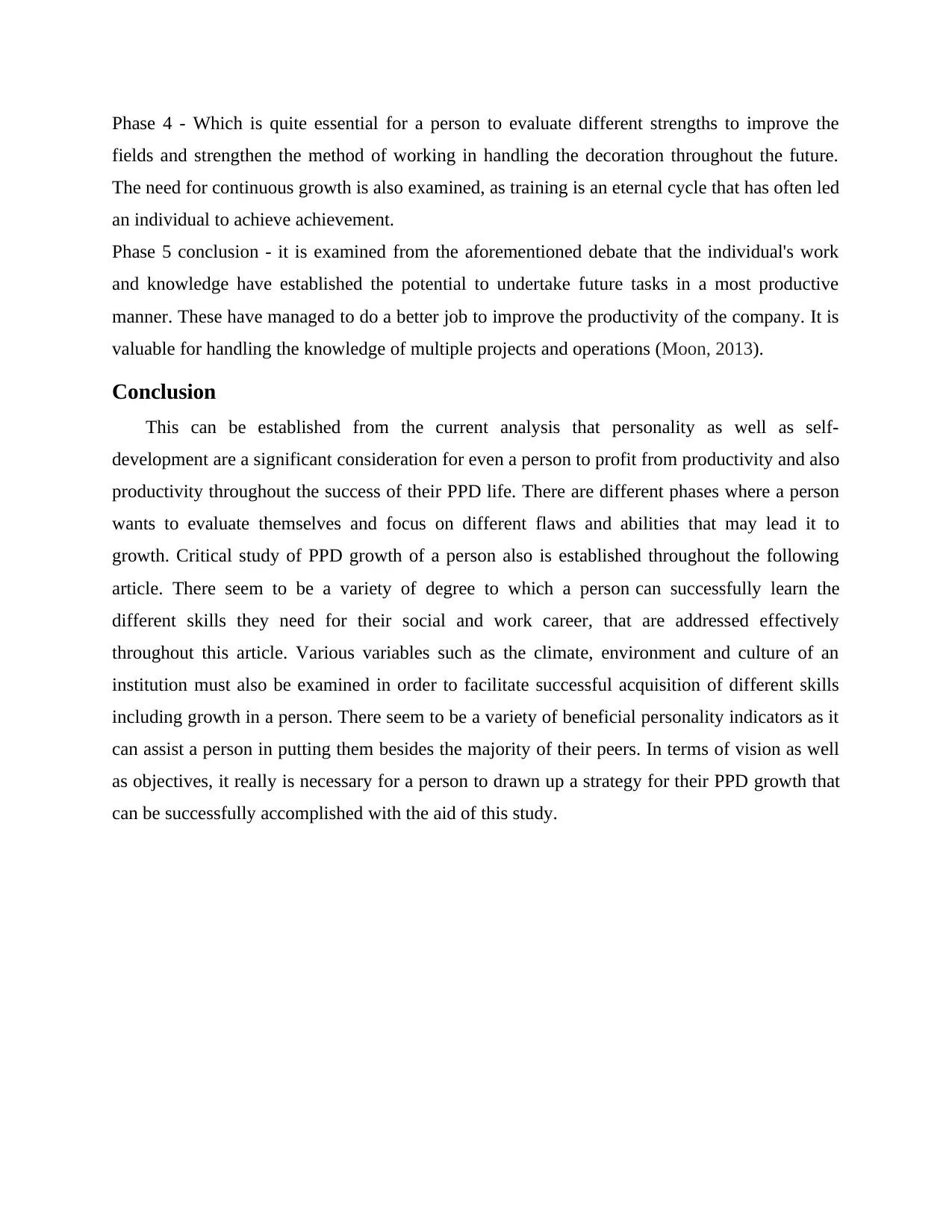
Phase 4 - Which is quite essential for a person to evaluate different strengths to improve the
fields and strengthen the method of working in handling the decoration throughout the future.
The need for continuous growth is also examined, as training is an eternal cycle that has often led
an individual to achieve achievement.
Phase 5 conclusion - it is examined from the aforementioned debate that the individual's work
and knowledge have established the potential to undertake future tasks in a most productive
manner. These have managed to do a better job to improve the productivity of the company. It is
valuable for handling the knowledge of multiple projects and operations (Moon, 2013).
Conclusion
This can be established from the current analysis that personality as well as self-
development are a significant consideration for even a person to profit from productivity and also
productivity throughout the success of their PPD life. There are different phases where a person
wants to evaluate themselves and focus on different flaws and abilities that may lead it to
growth. Critical study of PPD growth of a person also is established throughout the following
article. There seem to be a variety of degree to which a person can successfully learn the
different skills they need for their social and work career, that are addressed effectively
throughout this article. Various variables such as the climate, environment and culture of an
institution must also be examined in order to facilitate successful acquisition of different skills
including growth in a person. There seem to be a variety of beneficial personality indicators as it
can assist a person in putting them besides the majority of their peers. In terms of vision as well
as objectives, it really is necessary for a person to drawn up a strategy for their PPD growth that
can be successfully accomplished with the aid of this study.
fields and strengthen the method of working in handling the decoration throughout the future.
The need for continuous growth is also examined, as training is an eternal cycle that has often led
an individual to achieve achievement.
Phase 5 conclusion - it is examined from the aforementioned debate that the individual's work
and knowledge have established the potential to undertake future tasks in a most productive
manner. These have managed to do a better job to improve the productivity of the company. It is
valuable for handling the knowledge of multiple projects and operations (Moon, 2013).
Conclusion
This can be established from the current analysis that personality as well as self-
development are a significant consideration for even a person to profit from productivity and also
productivity throughout the success of their PPD life. There are different phases where a person
wants to evaluate themselves and focus on different flaws and abilities that may lead it to
growth. Critical study of PPD growth of a person also is established throughout the following
article. There seem to be a variety of degree to which a person can successfully learn the
different skills they need for their social and work career, that are addressed effectively
throughout this article. Various variables such as the climate, environment and culture of an
institution must also be examined in order to facilitate successful acquisition of different skills
including growth in a person. There seem to be a variety of beneficial personality indicators as it
can assist a person in putting them besides the majority of their peers. In terms of vision as well
as objectives, it really is necessary for a person to drawn up a strategy for their PPD growth that
can be successfully accomplished with the aid of this study.
⊘ This is a preview!⊘
Do you want full access?
Subscribe today to unlock all pages.

Trusted by 1+ million students worldwide
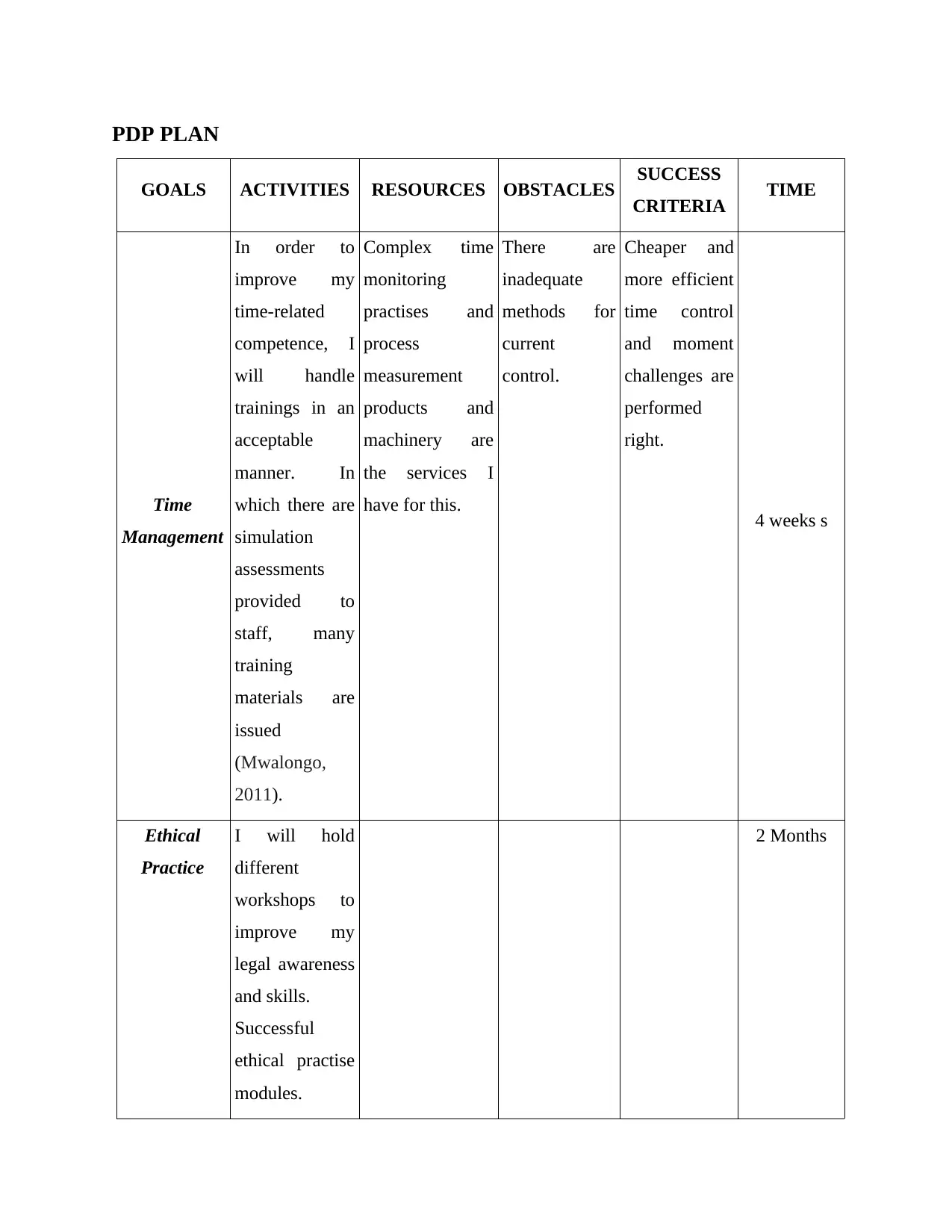
PDP PLAN
GOALS ACTIVITIES RESOURCES OBSTACLES SUCCESS
CRITERIA TIME
Time
Management
In order to
improve my
time-related
competence, I
will handle
trainings in an
acceptable
manner. In
which there are
simulation
assessments
provided to
staff, many
training
materials are
issued
(Mwalongo,
2011).
Complex time
monitoring
practises and
process
measurement
products and
machinery are
the services I
have for this.
There are
inadequate
methods for
current
control.
Cheaper and
more efficient
time control
and moment
challenges are
performed
right.
4 weeks s
Ethical
Practice
I will hold
different
workshops to
improve my
legal awareness
and skills.
Successful
ethical practise
modules.
2 Months
GOALS ACTIVITIES RESOURCES OBSTACLES SUCCESS
CRITERIA TIME
Time
Management
In order to
improve my
time-related
competence, I
will handle
trainings in an
acceptable
manner. In
which there are
simulation
assessments
provided to
staff, many
training
materials are
issued
(Mwalongo,
2011).
Complex time
monitoring
practises and
process
measurement
products and
machinery are
the services I
have for this.
There are
inadequate
methods for
current
control.
Cheaper and
more efficient
time control
and moment
challenges are
performed
right.
4 weeks s
Ethical
Practice
I will hold
different
workshops to
improve my
legal awareness
and skills.
Successful
ethical practise
modules.
2 Months
Paraphrase This Document
Need a fresh take? Get an instant paraphrase of this document with our AI Paraphraser
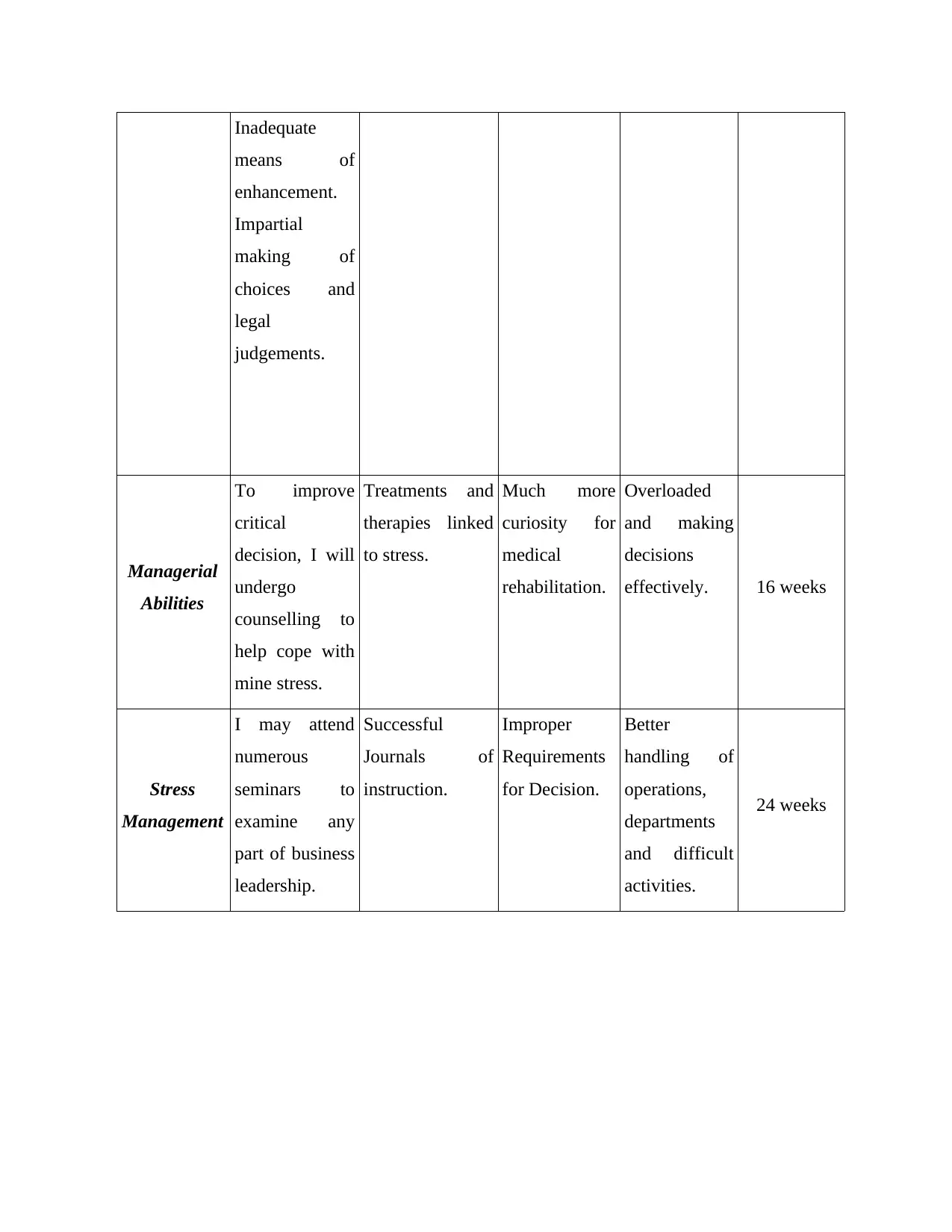
Inadequate
means of
enhancement.
Impartial
making of
choices and
legal
judgements.
Managerial
Abilities
To improve
critical
decision, I will
undergo
counselling to
help cope with
mine stress.
Treatments and
therapies linked
to stress.
Much more
curiosity for
medical
rehabilitation.
Overloaded
and making
decisions
effectively. 16 weeks
Stress
Management
I may attend
numerous
seminars to
examine any
part of business
leadership.
Successful
Journals of
instruction.
Improper
Requirements
for Decision.
Better
handling of
operations,
departments
and difficult
activities.
24 weeks
means of
enhancement.
Impartial
making of
choices and
legal
judgements.
Managerial
Abilities
To improve
critical
decision, I will
undergo
counselling to
help cope with
mine stress.
Treatments and
therapies linked
to stress.
Much more
curiosity for
medical
rehabilitation.
Overloaded
and making
decisions
effectively. 16 weeks
Stress
Management
I may attend
numerous
seminars to
examine any
part of business
leadership.
Successful
Journals of
instruction.
Improper
Requirements
for Decision.
Better
handling of
operations,
departments
and difficult
activities.
24 weeks
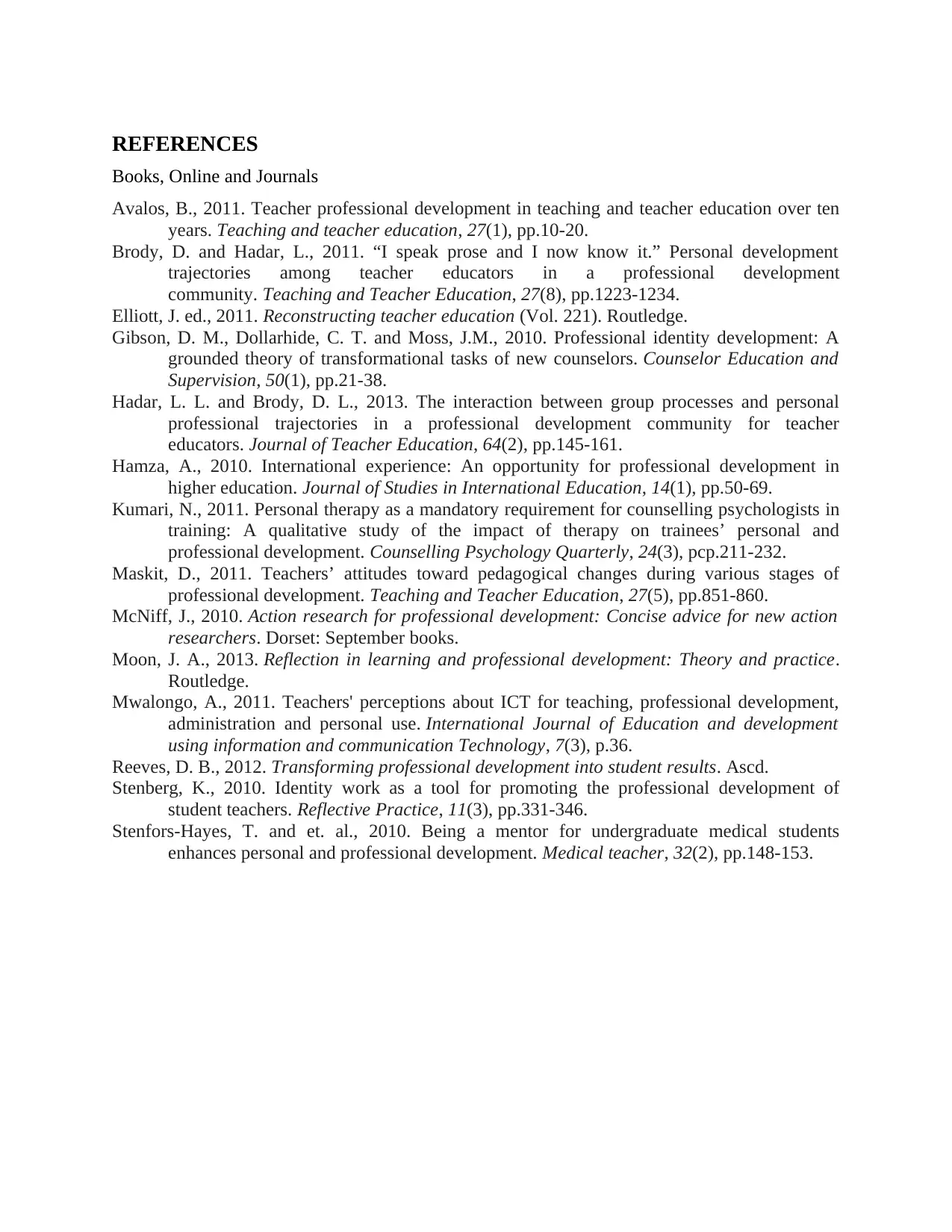
REFERENCES
Books, Online and Journals
Avalos, B., 2011. Teacher professional development in teaching and teacher education over ten
years. Teaching and teacher education, 27(1), pp.10-20.
Brody, D. and Hadar, L., 2011. “I speak prose and I now know it.” Personal development
trajectories among teacher educators in a professional development
community. Teaching and Teacher Education, 27(8), pp.1223-1234.
Elliott, J. ed., 2011. Reconstructing teacher education (Vol. 221). Routledge.
Gibson, D. M., Dollarhide, C. T. and Moss, J.M., 2010. Professional identity development: A
grounded theory of transformational tasks of new counselors. Counselor Education and
Supervision, 50(1), pp.21-38.
Hadar, L. L. and Brody, D. L., 2013. The interaction between group processes and personal
professional trajectories in a professional development community for teacher
educators. Journal of Teacher Education, 64(2), pp.145-161.
Hamza, A., 2010. International experience: An opportunity for professional development in
higher education. Journal of Studies in International Education, 14(1), pp.50-69.
Kumari, N., 2011. Personal therapy as a mandatory requirement for counselling psychologists in
training: A qualitative study of the impact of therapy on trainees’ personal and
professional development. Counselling Psychology Quarterly, 24(3), pcp.211-232.
Maskit, D., 2011. Teachers’ attitudes toward pedagogical changes during various stages of
professional development. Teaching and Teacher Education, 27(5), pp.851-860.
McNiff, J., 2010. Action research for professional development: Concise advice for new action
researchers. Dorset: September books.
Moon, J. A., 2013. Reflection in learning and professional development: Theory and practice.
Routledge.
Mwalongo, A., 2011. Teachers' perceptions about ICT for teaching, professional development,
administration and personal use. International Journal of Education and development
using information and communication Technology, 7(3), p.36.
Reeves, D. B., 2012. Transforming professional development into student results. Ascd.
Stenberg, K., 2010. Identity work as a tool for promoting the professional development of
student teachers. Reflective Practice, 11(3), pp.331-346.
Stenfors-Hayes, T. and et. al., 2010. Being a mentor for undergraduate medical students
enhances personal and professional development. Medical teacher, 32(2), pp.148-153.
Books, Online and Journals
Avalos, B., 2011. Teacher professional development in teaching and teacher education over ten
years. Teaching and teacher education, 27(1), pp.10-20.
Brody, D. and Hadar, L., 2011. “I speak prose and I now know it.” Personal development
trajectories among teacher educators in a professional development
community. Teaching and Teacher Education, 27(8), pp.1223-1234.
Elliott, J. ed., 2011. Reconstructing teacher education (Vol. 221). Routledge.
Gibson, D. M., Dollarhide, C. T. and Moss, J.M., 2010. Professional identity development: A
grounded theory of transformational tasks of new counselors. Counselor Education and
Supervision, 50(1), pp.21-38.
Hadar, L. L. and Brody, D. L., 2013. The interaction between group processes and personal
professional trajectories in a professional development community for teacher
educators. Journal of Teacher Education, 64(2), pp.145-161.
Hamza, A., 2010. International experience: An opportunity for professional development in
higher education. Journal of Studies in International Education, 14(1), pp.50-69.
Kumari, N., 2011. Personal therapy as a mandatory requirement for counselling psychologists in
training: A qualitative study of the impact of therapy on trainees’ personal and
professional development. Counselling Psychology Quarterly, 24(3), pcp.211-232.
Maskit, D., 2011. Teachers’ attitudes toward pedagogical changes during various stages of
professional development. Teaching and Teacher Education, 27(5), pp.851-860.
McNiff, J., 2010. Action research for professional development: Concise advice for new action
researchers. Dorset: September books.
Moon, J. A., 2013. Reflection in learning and professional development: Theory and practice.
Routledge.
Mwalongo, A., 2011. Teachers' perceptions about ICT for teaching, professional development,
administration and personal use. International Journal of Education and development
using information and communication Technology, 7(3), p.36.
Reeves, D. B., 2012. Transforming professional development into student results. Ascd.
Stenberg, K., 2010. Identity work as a tool for promoting the professional development of
student teachers. Reflective Practice, 11(3), pp.331-346.
Stenfors-Hayes, T. and et. al., 2010. Being a mentor for undergraduate medical students
enhances personal and professional development. Medical teacher, 32(2), pp.148-153.
⊘ This is a preview!⊘
Do you want full access?
Subscribe today to unlock all pages.

Trusted by 1+ million students worldwide
1 out of 12
Related Documents
Your All-in-One AI-Powered Toolkit for Academic Success.
+13062052269
info@desklib.com
Available 24*7 on WhatsApp / Email
![[object Object]](/_next/static/media/star-bottom.7253800d.svg)
Unlock your academic potential
Copyright © 2020–2026 A2Z Services. All Rights Reserved. Developed and managed by ZUCOL.





